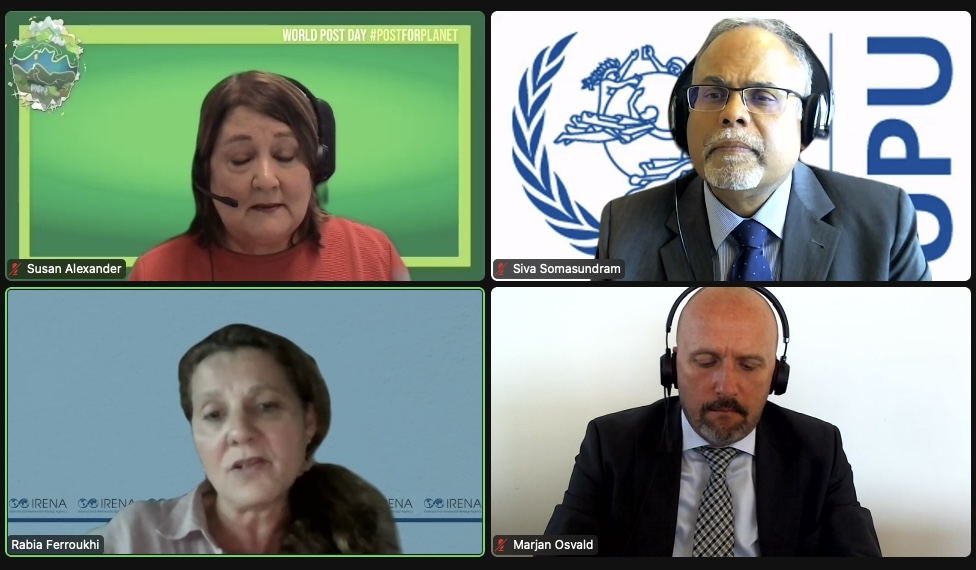The online roundtable, titled “Post for planet: Green energy pathways for a reliable & resilient sector,” brought together experts from the energy and postal sectors to discuss the industry’s transition to renewable energy.
The event was held on 4 October within the context of the UPU’s World Post Day celebrations. This online roundtable reviewed the need for climate action across the postal network through the lens of current threats to energy security.Opening the event, UPU Deputy Director General Marjan Osvald said, “Any threats to the supply or affordability of energy should be considered a threat to the postal system itself.”
The Deputy Director General also noted the danger extreme weather events exacerbated by climate change posed to the sector.
“What matters is how we respond to these threats. Our postal infrastructure needs to be resilient to these disruptions. We need to invest in infrastructure that can adapt to a new reality, and recover quickly from extreme events,” he added.
Setting the stage
UPU Director of Policy, Regulation and Markets Siva Somasundram was joined by International Renewable Energy Agency (IRENA) Director of Knowledge, Policy and Finance Centre Dr Rabia Ferroukhi to discuss the current state of energy supply and transitions to greener alternatives within the postal sector and beyond.
Dr Ferroukhi highlighted the importance of a transition to renewable energy in order to mitigate climate change, but also to ensure energy security and reduce energy poverty, noting in particular gaps between developed and developing countries.
She added that electrification was a key component of the renewable energy mix, and that Posts would do well to prioritize overhauling their fleets from fossil fuel-powered vehicles to electric ones.
Somasundram emphasized that the effort to transition would make good business sense.
“Civil society is moving towards demand for more climate conscious services, so there is an opportunity for Posts to corner this niche of greener products and services that customers are demanding,” he said.
He agreed there were disparities within the postal sector in terms of technology, knowledge and ability to implement best practices in transitioning to renewable energy infrastructure, adding that the UPU was working to close these gaps. He noted the need to secure stable financing streams for climate projects.
Postal successes
The second panel presented two successful examples of Posts who were financing their green transition through different means.
La Poste France’s Head of European CSR Affairs, Margaux Meidinger, joined the panel to share the operator’s successful funding initiatives. Its green bond secured EUR 500 million in 2018 for reducing emissions from transport and buildings. Based upon this success, another EUR 1.2 Billion was secured through its sustainability bond in 2022, enabling more investment in clean transportation and buildings, in addition to social impact projects.
“Greening our bonds is one of the ways of greening our economy. Investors are really looking for these kinds of projects because they want to invest in the green economy,” she explained, noting that their sustainability bond was 2.4 times oversubscribed, and that the trend was already taking hold in other sectors.
Verny Rodríguez Martínez, Coordinator of Environmental Management Commission for Correos Costa Rica, presented the post’s recent project to implement electric vehicles and solar panels, which was funded through the Central American Bank for Economic Integration.
He detailed the postal operator’s commitment to a thorough Institutional Environmental Management Programme, which begins with measuring its own carbon footprint through the UPU’s Online Solution for Carbon Analysis and Reporting (OSCAR).
“OSCAR was our base that helped us identify our need to replace our fleet of fossil fuel-based vehicles to electric vehicles,” he said.
Somasundram underlined the importance of measuring the sector’s carbon footprint, encouraging others to make use of OSCAR to help better track the sector’s impact on global emissions.
“The postal sector is a key component of the logistics sector and we do have a significant footprint. It’s time that we seek to address this at a concerted level,” he said.
Voluntary emissions reduction targets are set to be defined under UPU Congress Resolution C 17/2021 on the reduction of greenhouse gas emissions in the postal sector.
The UPU encourages all operators to establish internal processes for tracking and reporting on their energy use, for the dual purpose of seeking greater energy security, and for reducing their greenhouse gas emissions.
Watch the webinar in English or Spanish.
